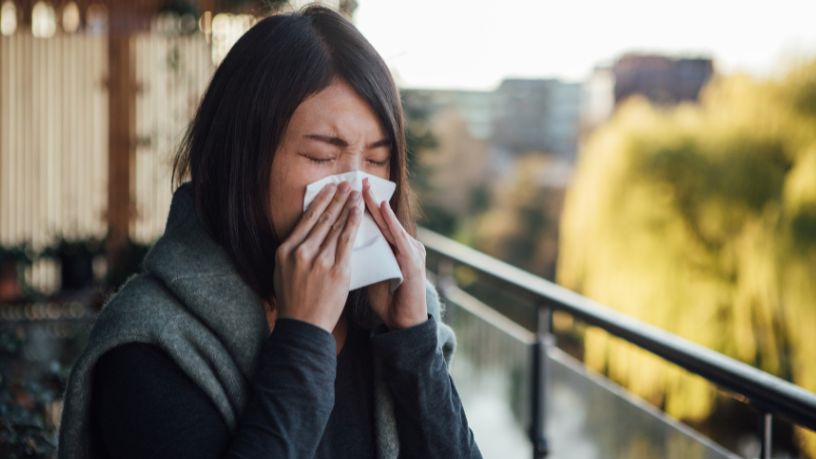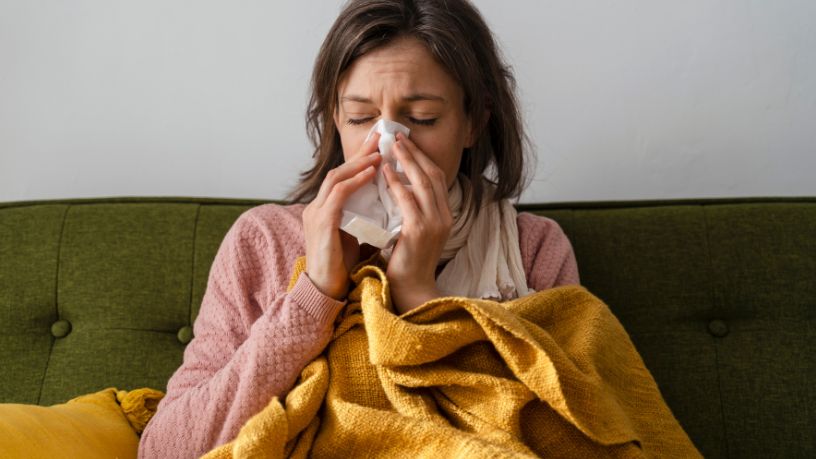The flu virus can cause fevers, muscle aches and fatigue.
On this page
Key takeaways
You can reduce your risk of getting the flu or lessen the severity of symptoms if you do get sick by getting the flu shot.
Explore treatments and home remedies that may help ease symptoms of the flu.
When you're struck down with influenza (the flu), you may have aching muscles, a sore throat, a raging temperature and just feel all round awful.
When the flu hits, it's not the time to soldier on. Your body needs rest. That's doctor's orders, according to Bupa GP Dr Janice Tan.
So, grab your coziest blanket, settle in, and explore these effective pharmaceutical options and comforting home remedies to help you feel better, faster.
Symptoms of the flu
Flu season in Australia typically ranges from June to September.1
More serious than the common cold, the flu can severely impact your respiratory system, affecting how you breathe and how your whole body feels.
Common symptoms of the flu include:1
- fever and chills
- cough
- sore throat
- sneezing and stuffy or runny nose
- tiredness
- headache
- muscle aches and joint pains.
Less common symptoms can include:
- abdominal pain
- nausea
- vomiting.
Is the flu serious?
While most healthy people will be able to cope with the flu without serious side effects, it can be dangerous and in some cases life threatening. Each year in Australia, the flu is linked to around 3,500 deaths and 18,000 hospitalisations.2
People most at risk include infants, older adults, people who are pregnant and those living with chronic health issues.
Even so-called 'mild' cases of the flu can floor you physically, making it impossible to work, look after the kids or do the simplest of everyday tasks, which is why it's so important for you to try to protect yourself as much as you can.
The best protection against the flu
While it's impossible to be totally protected from every strain of the flu, the best way to stay healthy is to get a flu vaccination at the start of each flu season, or just before.3
Shots usually become available from your GP or local chemist from around April each year and are free for some people including:
- children aged 6 months to under 5 years
- people who are pregnant
- people aged 65 and over
- Aboriginal and Torres Strait Islander people
- people with certain medical conditions.
"On average, the vaccination should be able to prevent you from getting the flu 50 to 70% of the time from the 4 predominant strains that season," says Dr Tan. "And even if you get the flu, if you've had the vaccination your symptoms will be less severe."
[Dr Simon Benson stands in a doctor's office with an empty exam bed behind him.]
Dr Simon Benson: Hi, I'm Dr Simon Benson from Bupa.
The weather's getting a bit colder, colds are becoming more and more frequent.
Well, colds are viruses. They're spread by droplets in the air. These can get into your nose, your mouth or your eyes and make you sick. How do you stop yourself from getting that?
Well, keep your hands clean; avoid touching your face around your mouth, your nose and your eyes; think about weaking a mask in busy environments.
If you do get sick, remember to cough and sneeze into your elbow, like this [Dr Benson demonstrates by lifting the inside of his crooked elbow to his mouth] in order to minimise the risk to those around you.
If you are sick, think about taking some vitamin C. There's a little bit of evidence that says it might reduce the length of time that you're unwell.
But above all, rest up, keep hydrated, and if you're unwell or things don't seem right to you, reach out to your doctor for an assessment.
Flu medication
There are some pharmaceutical medications that can help ease the most common and uncomfortable flu symptoms, says Dr Tan.
"Common flu symptoms, such as fevers, muscle aches and fatigue, are mainly due to inflammation. So, when the flu virus infects the body, this causes inflammation in the cells. Plus, our body mounts its own immune response to the flu virus, which causes further inflammation.
"Medication such as paracetamol and ibuprofen can help to treat those inflammatory responses. Just be sure to take them based on your doctor's advice, your past medical history and within the normal dosages."
While there are medications advertised as being cold and flu specific, they won't treat the inflammation causing the symptoms any better than paracetamol and ibuprofen, says Dr Tan.
"Medication like pseudoephedrine might help reduce symptoms like a runny nose or give you an energy boost when you're feeling fatigued. But it doesn't address the reason you're feeling that way."
In some cases, antiviral medications can be helpful for managing the flu, particularly for those at higher risk of complications.
When taken within the first 48 hours of symptoms, these medications may shorten the duration of illness and ease its severity. They're not necessary for everyone, so it's best to speak with your GP to see if they're the right option for you.
Get chemist delivery
Bupa health insurance members can have prescriptions filled by local chemists and get them delivered to their door by registered couriers. You can also order over-the-counter goods. Delivery address must be within 8km of a participating pharmacy.
Home remedies for the flu
Two of the most important things you can do at home if you have the flu are rest and stay hydrated, says Dr Tan.
"Rest is the number one piece of advice I give to my patients to help recovery, especially in the first 2 to 3 days of the illness," says Dr Tan. "When your body mounts an immune response to the virus, everything goes into overdrive. Rest is key to helping the body recover. A lot of people, especially busy, working adults don't recognise this and tend to push on, which makes recovery take longer."
And while you may lose your appetite, Dr Tan says keeping your fluids up is also essential.
"Keeping the body hydrated is key, because it helps the body in the recovery by fuelling the cells which helps fight inflammation and mount that immune response. It's important to note that people may get fevers and sweat a lot with the flu, causing abnormal losses in fluids, which can contribute to dehydration."
Eat if you can, but don't stress if you have no appetite. Just keep your body hydrated.
Other home remedies include steam inhalation to help dislodge congestion in the nose and chest, and a spoonful of honey to soothe a sore throat. Research also shows chicken soup is more than just a comfort food for the flu as it has anti-inflammatory properties and helps boost immunity.4
When is it time to see a doctor for the flu?
While medication and home remedies can help to aid recovery and ease symptoms, in some cases it's important to see a doctor when you have the flu.
"If an otherwise healthy person is still feeling sick after 5 to 7 days, you might want to go and see the GP," says Dr Tan. "If you‘re immunocompromised, pregnant or elderly, you might want to see a doctor earlier than this. Your doctor might prescribe an antiviral treatment that can reduce the amount of time you are sick for, but it's not the best option for everyone as it can cause side effects."
No matter how long you've been sick for, if you're experiencing severe symptoms you should see a doctor or go to the emergency department immediately, says Dr Tan.
"If you have any trouble breathing, have chest pain, are feeling confused or keep vomiting and become dehydrated, don't think twice about going to the emergency room."
With rest, hydration, and the right treatment, most people recover from the flu within a week. Listen to your body, be kind to yourself and don't hesitate to seek medical advice if you need it.

At Bupa, trust is everything
Our health and wellbeing information is regularly reviewed and maintained by a team of healthcare experts, to ensure its relevancy and accuracy. Everyone's health journey is unique and health outcomes vary from person to person.
This content is not a replacement for personalised and specific medical, healthcare, or other professional advice. If you have concerns about your health, see your doctor or other health professional.
1Healthdirect. (2024). Flu. Healthdirect.
2Australian Centre for Disease Control. (2025). Seasonal flu (seasonal influenza). Australian Government.
3Australian Government, Department of Health and Aged Care. (2025). Influenza vaccination. Australian Government.
4Crompton, S. (2018). How to beat the winter lurgy. BBC Science Focus.
You might also like...
Why get the flu shot?
Your annual flu jab can help reduce your risk of catching the virus and lower the severity of your symptoms if you do get it. Find out how it works.
Flu: Common symptoms and how to protect your health
The flu is highly contagious and more serious than a common cold. Find out how the flu works, the common symptoms and what you can do to reduce your risk.
The flu shot and pregnancy
The best way to protect yourself and your unborn baby from flu is to get vaccinated. We answer some common questions with the help of Dr Janice Tan.
The difference between a common cold and the flu
Colds and the flu can share a lot of the same symptoms, so we asked Dr Janice Tan how you can tell the difference and what you can do to reduce your risk.





